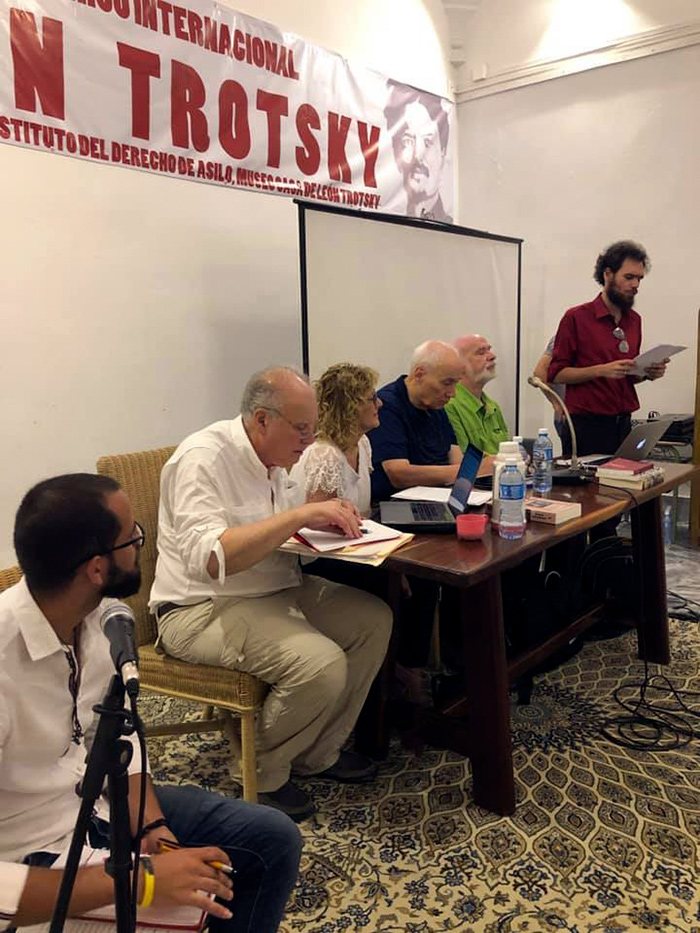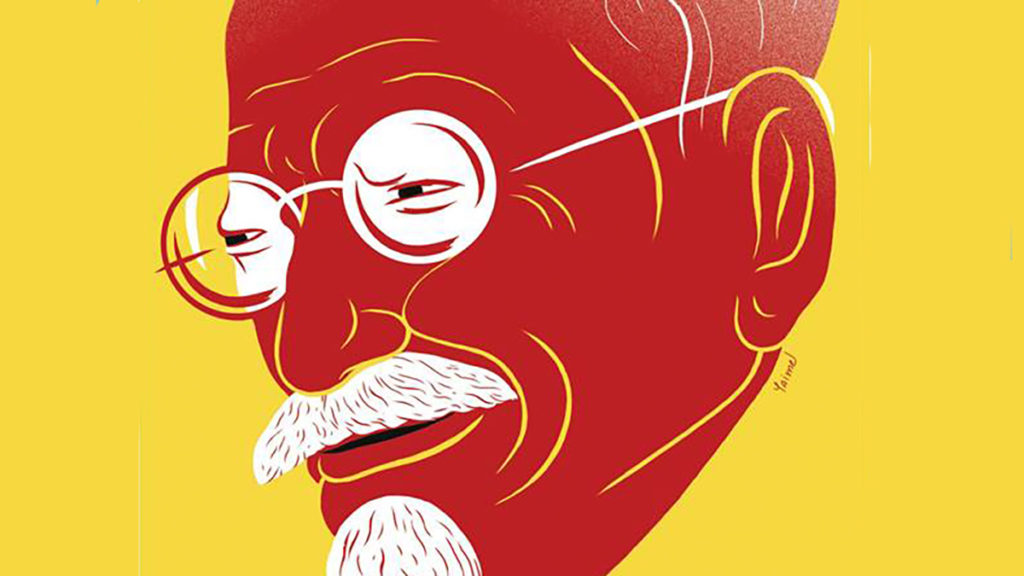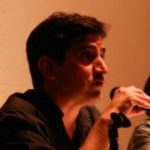What is your assessment of the Trotsky event held in Cuba?
I always thought that the event was going to mark a before and an after. I know that if we had done it in Brazil or Mexico—countries where it is possible that the 2nd and 3rd edition of this meeting will take place—it would not have been the same, because, although we have not had much financing due to all the economic problems that Cuba has, we did achieve a very large international participation, with high-level presenters such as Robert Brenner, Paul LeBlanc, Susy Weissman or Eric Toussaint, You have come [CEIP León Trotsky, N del E], those from the Karl Marx Center for Socialist Studies, the Casa León Trotsky Museum, researchers from the three most important universities in Brazil have arrived, participants and academics have come who at other times are not meeting because of the traditional disputes that their political organizations have, but who come because Cuba is everyone’s land and nobody’s.
Trotsky, Cuba and the current situation in the country have brought people from all over the world: from India, Iran, Turkey, Italy, Austria, Germany, France, Great Britain, Argentina, Canada, Spain, the United States, Mexico, Peru, Venezuela, Brazil, intellectuals from Colombia and Pakistan, who were finally unable to attend, Michael Lowy and Tariq Ali also wanted to be present and at least ten other exhibitors. The event, in fact, should have lasted four days, but it was impossible, almost impossible, and cannot leave. We had a very difficult logistical situation so we couldn’t receive a foreign audience. I hope you understood and didn’t bother with us. To those of us who asked them not to come, we never did so for political reasons, much less for personal reasons. If we had accepted the 192 applications for public participation we would have collapsed, in fact, you saw that in the room where we were, they would not have had space.
The only thing I didn’t like about the event is that there wasn’t much Cuban public, which I think was due to bad management, it’s our responsibility, and that could give the false idea that in Cuba there is no will to meet Trotsky. Moreover, the lack of time caused the program not to be ready for the first day.
But the event, for me, in spite of its problems, is a total advance. In addition, the Institute of Philosophy undertook to publish the memoirs of the event, an institute that if it had not been for him we would not be here today. We must also thank the director of Casa Benito Juárez, where this congress was held. And we would also like to thank the logistical support given to us by the Juan Marinello Cuban Institute of Cultural Research, which also seems to be preparing to collaborate in the publication of the memoirs.
If this is done, if this book is published, it would be the first time that a book dedicated to Trotsky and the sociopolitical-cultural phenomena that has been generated around him would appear in Cuba. Trotsky’s other text that appeared, as a book, was published in the sixties by the militants of the Revolutionary Workers’ Party (Trotskyist), who were militants in the Fourth International Posadista. That book did not travel around the country because it was confiscated and never went to press.

Were other articles or materials by Trotsky published?
In Cuba, only the following articles by Trotsky have been published without suffering censorship: one in the Revolution newspaper, of the 26th of July movement, in the cultural supplement “Lunes de Revolución” where a very short excerpt from the History of the Russian Revolution, published by Guillermo Cabrera Infante, appeared. That was in 1960.
Later, in 2014-2015, “Lenin’s Last Struggle” was published in Cuba, a compilation of Lenin’s writings and letters, which was originally published by Pathfinder Publishing, which ceded its rights to the Social Sciences Publishing House; there appeared some letters from Trotsky to Lenin. And after I taught the postgraduate course on Leon Trotsky, in November 2016—the first in Cuba and had a great impact on the student body—almost two years later, in January 2018, the centennial of the Red Army, part of Trotsky’s speech at the founding of the Red Army was published in a Santa Clara cultural magazine.
So now, when we publish this book, we are going to live in Cuba a before and an after, because when all the presentations that were made are published, we are going to skip the political taboo that is Trotsky. With Trotsky in Cuba something very similar happened to what the Peruvian writer Héctor Béjar says in his book, which was awarded the Casa de las Américas Essay Prize in 1966, when he stated that after the 20th Congress of the CPSU, we all knew about Stalin’s crimes but nobody told us that the one who was not a criminal was Trotsky.
And the same thing happened in Cuba: after the fall of the Soviet Union, we all knew about Stalin’s crimes, but no one here has said that Trotsky was not guilty of what he was accused of. That is the importance of the event. To begin to say in Cuba that nothing that was said about Trotsky is true. And Trotsky is not even mentioned in the history books that students receive. Maybe the university students know him, but it’s very difficult for high school students to know about him.
Without a doubt, Padura’s work, “The Man Who Loved Dogs”, helped arouse curiosity, but they have no book to go to cover the doubts and learn more. On the other hand, friend and comrade Celia María Hart Santamaría could not successfully spread Trotsky[‘s ideas] in Cuba. Circumstances made her end up being a sniper on the roof of a tower. No one saw her, no one could see her, even though they felt her shots, accurate, very accurate.
They talk about the dynamics of the event and the first repercussions.
The academic level is very good, excellent, there is no complaint. We have to thank everyone for their presence. There was even the collaboration of Lindy Laub, a well-known North American filmmaker, who had participated in the Festival del Nuevo Cine Latinoamericano, here in Havana in 1999, and Suzi Weissman, her producer, who in turn was a speaker. They both brought a documentary that we enjoyed the 42-minute work-in-progress, “The Most Dangerous Man in the World” with unpublished images that no one has ever seen. We did this in a small but very collaborative room of the Young Directors Exhibition. Unfortunately, there weren’t many Cubans, but the important thing is that it was projected in Cuba.
What is real is that Trotsky, as a historical character has had an impact on sectors of the Cuban university student body, since students from Santiago de Cuba wanted to come to the event, they came from Santa Clara without even having the economic conditions, they came from Matanzas. Today in Santa Clara and Havana there are students who are reading and studying the books that you and other comrades brought to the event. For them, for those Cuban students, I ask for the most solidary of the help. They have only two titles. So I call on internationalism to send them material, magazines, books.
“Escritos Latinoamericanos” is, moreover, a text that has impressed some Cuban historians very much, because we had never been able, or even knew, that León Bronstein had dedicated political analysis articles to the Cuban situation of his time and especially to the Bolshevik Leninist Party. For me, who wrote the history of Cuban Trotskyism, that is a fundamental contribution. Another important point is that this Friday “Escritos Latinoamericanos” will be donated, along with the text by Gabriel García Higueras, “Trotsky en el espejo de la historia,” to the library of the House of the Americas, the institution that attracted intellectuals such as Cortázar, Benedetti, Galeano and that today continues to be one of the best points of convergence on the continent. This library is very much visited by the Havana intellectuals. Also this Friday, May 17, “Escritos…” will arrive at the libraries of the Faculty of Philosophy and History, and at the Central Library of the University of Havana.
I always make a very necessary clarification: the event was an academic activity about Trotsky and all the political, social and cultural phenomena that came out of it. It was not a call for international Trotskyist convergence. The perception that we young people have that we feel part of the Cuban Marxist left, that we use Marxism to understand reality, is that Trotsky belongs to the system of communist ideas, to all the theory that Gramsci, Rosa Luxemburg, Lenin, Marx, Mariátegui give us. Some bureaucrats want to point out Trotskyists to us; I have nothing against Trotskyism, evidently, yes, some necessary and enriching divergences of criteria, but let’s remember that Stalin began to use that term to make believe that the followers of the Left Opposition were not Leninist Bolsheviks, but a tendency alien to the revolution.
We were missing Trotsky. We lacked Trotsky to understand what happened in the Soviet Union, because none of the referents of Marxism that I mentioned, as well as Che Guevara or Fidel Castro, could, for different reasons, give a systemic explanation of what happened. Trotsky has the courage to have done so since 1936, the courage to have developed a sociological analysis that we didn’t know about, and for which we Cubans are very interested.
First published in Spanish in Ideas de Izquierda on May 19, 2019.
Translated by Walter Lippmann for his web site. Republished with permission.











